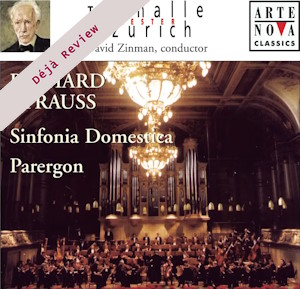
Déjà Review: this review was first published in August 2003 and the recording is still available.
Richard Strauss (1864-1949)
Sinfonia Domestica Op. 53 (1923)
Parergon Op. 73 (1924)
Roland Pöntinen (piano)
Tonhalle Orchestra Zürich/David Zinman
Arte Nova Classics 74321 983352 [65]
Strauss was not averse to making himself the subject of his own works, for example as a hero in Ein Heldenleben, a lover in Intermezzo and a father figure in Sinfonia Domestica, which he dedicated to his ‘dear wife and children’. That he pursued this lavish self-promotion through thrilling melodies and brilliant orchestration does not alter the fact that the ‘plot’ is not particularly interesting; so why not relax and let this voluptuous music wash over you? This could be a reasonable alternative to trying to sort out the domestic squabbles, splendours and miseries of the Strauss family while listening. Papa might occasionally sound like a self-obsessed old windbag, but he’s never boring.
It seems almost as though both these works were allowed to evolve in an improvisatory way; yet Strauss’s mastery of form and dramatic incident is evident throughout. Nothing happens by chance, and through all five movements of the Sinfonia the rich fabric is embroidered with colourful threads and thrilling highlights. As in Ein Heldenleben, there are quotations, and near-quotations, from other Strauss works; yet, though Sinfonia Domestica might appear an obvious example of programme music, it possesses relatively few of the deft programmatic touches that make Til Eulenspiegel and Don Juan masterpieces of musical scene painting.
Zinman’s approach is refreshing, highlighting the invention and vivacity that pervades this unusual work. The well-upholstered sound that has long characterised Strauss performances by most of today’s European orchestras is replaced by a clean, clear interpretation with a by no means leisurely beat that neatly evades pomposity.
Strauss added a further ‘chapter’ to his story in Parergon, written a year later for piano (left hand) and dedicated to the pianist Paul Wittgenstein (1887-1961) who had lost his right arm in the war of 1914-18. It contains five interconnected sections, and is described in the insert booklet as ‘a symphonic virtuoso piano.piece’. Parergon has been said to reflect Strauss’s undefined anxieties about his own son. Once again these subjective allusions need not unduly bother the listener. The work is markedly different in scale and size from the Sinfonia, tonal and academic in character, it does not lack interest and its inclusion on this disc is justified, if only on the grounds of completeness. But, though excellently performed, in my view it does not make a satisfactory link to the Sinfonia and it is easier to regard it as a separate work.
Roy Brewer
Buying this recording via a link below generates revenue for MWI, which helps the site remain free


















